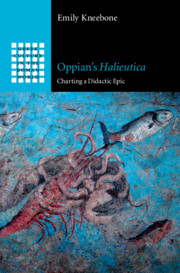Book contents
- Oppian’s Halieutica
- Greek Culture in the Roman World
- Oppian’s Halieutica
- Copyright page
- Epigraph
- Contents
- Acknowledgements
- Introduction: On Fishing
- Part I Didactic Poetry
- Part II Morality at Sea
- Part III Humans and Animals
- Part IV The World Is a Sea
- Chapter 10 Locating Monsters
- Chapter 11 An Empire of Fish
- Bibliography
- Subject Index
- Index Locorum
Chapter 10 - Locating Monsters
from Part IV - The World Is a Sea
Published online by Cambridge University Press: 24 September 2020
- Oppian’s Halieutica
- Greek Culture in the Roman World
- Oppian’s Halieutica
- Copyright page
- Epigraph
- Contents
- Acknowledgements
- Introduction: On Fishing
- Part I Didactic Poetry
- Part II Morality at Sea
- Part III Humans and Animals
- Part IV The World Is a Sea
- Chapter 10 Locating Monsters
- Chapter 11 An Empire of Fish
- Bibliography
- Subject Index
- Index Locorum
Summary
The final book of the Halieutica is devoted primarily to κήτεα or large sea-creatures: dolphins, seals, dogfish, and other sizeable species. The core of the book relates the dramatic process of hunting and killing a vast and terrifying sea-monster, a beast that lies somewhere between a shark and a whale in form.1 This is a hunt of epic proportions: the account occupies the first half of the book (5.46–349), incorporates over a dozen extended similes and a barrage of metaphors and comparisons, and culminates in crowd of gawping onlookers, one of whom utters a terrified prayer at the sight of the creature’s grim corpse. No other episode in the Halieutica is related at such length. At the height of the hunt the whale thrashes furiously on an oversized hook, churning the sea with its panting breaths (5.207–22). This chapter builds outwards from an analysis of this moment, arguing that the episode confronts the reader with a vision of poetic allusivity in its most magisterial, incorporative guise. The scene, I show, draws attention to the scale, truth status, and power of epic poetry itself. The monstrous κῆτος represents a provocatively overpopulated palimpsest of myths, threats, and jostling epic intertexts – a composite foe that incorporates elements of Typhon and the Titans, Polyphemus, Charybdis, the Clashing Rocks, and the κήτεα of the wider poetic tradition.
- Type
- Chapter
- Information
- Oppian's HalieuticaCharting a Didactic Epic, pp. 345 - 387Publisher: Cambridge University PressPrint publication year: 2020



